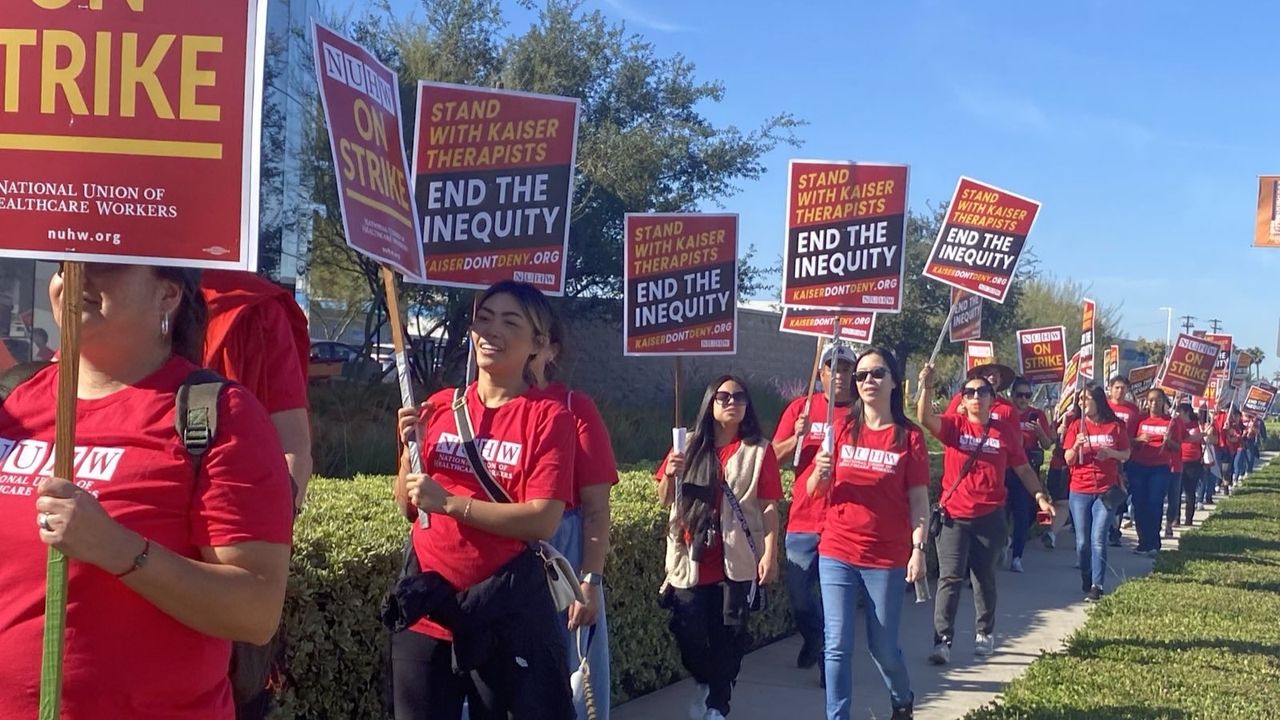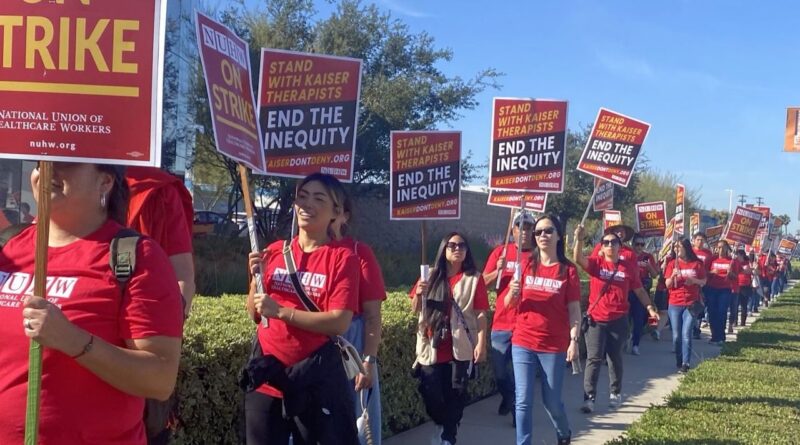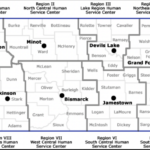Kaiser Permanente California mental health workers continue to strike for better patient care and safer pensions
Are you a Kaiser mental health worker? To learn more about building a rank-and-file strike committee, fill out this information structure at the bottom of this article.
A strike by 2,400 Kaiser Permanente mental health workers in Southern California has entered its fourth week. The workers, who have had a contract since the end of September, want more time between deployments to prepare for patients, in addition to an increase in wages and pension benefits.

Kaiser mental health doctors in Northern California staged a ten-week strike two years ago to get some of these small improvements. But Kaiser is opposed to small concessions to their partners in southern California.
With its approval, the National Union of Healthcare Workers (NUHW) has adopted a two-tier system for mental health care at Kaiser where NUHW members in Northern California have a pension while members in Southern California they have not received a pension for a long time. ten years. Although the union says it is fighting to increase patient care hours, provide adequate wages and restore pensions, NUHW leaders have ruled out a full-scale strike and limited the walkout to just a few days and locations. selected.
Health care, especially mental health care, has been experiencing staff shortages since before the outbreak of the COVID-19 pandemic. Health workers are notorious for working long hours, with shifts often being 12 hours long, before any kind of time. This has contributed to the labor crisis where many workers—even those who have been in the field for decades—have left to look for less demanding jobs.
As has been the case with many other health care strikes, workers point to the conditions of their patients as one of the causes of their problems. In this case, the issue of having more time to prepare patients is very important. As one psychiatrist said Los Angeles Times“It is really difficult to remain a professional in this system. We have to make decisions like, ‘Do I look someone in the eye, or do I finish this letter?’
Last year, Kaiser agreed to a $200 million settlement with the state of California over long wait times for treatment. Part of the settlement included Kaiser agreeing to address staffing issues, and increase spending over the next five years to improve its mental health services.
Although the Kaiser system has officially agreed with those terms, it has made efforts to combine patient time with “indirect patient care”—which includes everything from monitoring, scheduling , writing documents. Forcing workers to do both jobs at the same time is, in fact, the mental health equivalent of a factory rush.
WSWS reporters spoke with protesters in the voting line at Kaiser Permanente Los Angeles Medical Center.
Speaking about staff demands for more time to prepare patients, William Johnson, marriage and family doctor and union representative with NUHW said, “It’s so that we can have adequate and protected time that is not directly from our patient care. Everything we have is face-to-face therapy within that individual hour. Beyond that, whether it’s case documents, to return patients, treatment plan, to do prescribed reports for adults or children, all of which is our indirect patient care time that we need.Ms. Kaiser currently has where they are able to access and book other patients, with sometimes new patients are in our situation. So what we’re asking for is what Northern California has, seven protected hours of that, and that way we’re able to get that care time. specifically of our patients. ”
Jeremy Simpkin, case manager at South Bay Psychiatry, spoke about his experience dealing with patients with severe mental illness. “We are a special program that works with people with serious mental illness. I see many people who rise to this level of hospitalization or are at risk of hospitalization because they are not receiving adequate care at the primary level. They come to Kaiser and say, ‘I need help.’ They have to wait. They get round between therapists. They don’t know who to talk to. They end up in trouble and end up in the emergency room. Every time, when I see someone come out of the hospital, I look at their chart and see, oh, this person could have prevented this tragedy if they had had care before they died. is it,” Simpkin said.
He added, “They see their doctor once a month, once every six to eight weeks, and more for some patients. They have to wait, and that’s not therapy, is it? When they run into problems, they reach out to their doctor who doesn’t have time to see them. And then they end up going to the emergency room. On the other side of it, when people leave the hospital, we can put them in a temporary program for some stabilization help. But once they return to the clinic, there is nowhere to send them. Once they’re hospitalized, we can’t send them out of Kaiser’s network because they take mild to moderate cases. So all severe cases must stay at home.
“So a person who has been hospitalized because of a suicide attempt sees a doctor once a month. Why do they only see a doctor once a month? Because we’re not too short-staffed, right? And that is, my department is quote un-quote full staffing, right? So that’s what Kaiser sees as enough to handle their thousands and thousands of patients in this area. They think, you know, just having a few doctors to see all these high-needs patients is fine. But it’s not like that.”
Simpkin concluded: “It’s going to take more, not the kind of traditional leadership model based on the capitalist structure. It takes us to stand up, and I hope that continues to move, and it can happen. I think we are entering a period where people will be struggling. We are going to struggle even more. And it doesn’t take coincidence to inspire change, right? I think that is my biggest hope. I am very worried about where we are going as a world, but I also have room to hope that these are the conditions that will promote change.”
NUHW workers have reduced the scope of the strike and have not presented serious demands to ensure adequate and safe worker standards for the patient or any other safeguards against the ongoing wave of the Covid-19 epidemic, which continues to devastate health services worldwide. .
In a statement in July, NUHW promoted Kamala Harris boasting that they have “twenty years of experience working hand-in-hand with Vice President Harris to improve the lives of working families in California.”
In fact, the Democrats who control every level of government in California have ensured that the government is the most unequal in the US. Throughout the Harris campaign, instead of making any appeals to the working class, Democrats tried to upstage Republicans from the right, doubling down on their views on elites. and big corporations and ensure the electoral victory of the fascist candidate Donald Trump.
Since the outbreak of the epidemic in 2020, health workers have experienced a significant decline in health and performance levels, as well as loss of life and disability from Long Covid as the Biden-Harris administration ends measures any remaining epidemic mitigation.
Mental health workers are not only against the Kaiser, they are against the entire political system driven by commercial profit and completely opposed to the needs of health workers and public health. The incoming Trump administration will seek to destroy any measures that health care workers have to protect themselves.
If the current problem is not to face the same outcome as the previous robbery strike, mental health workers must take the fight into their own hands by forming a rank and file strike committee. The committee should outline non-negotiable demands for workers, which include wage increases that reduce the deficit, fully paid pensions and health benefits, and restrictions on wage increases. of patients.
The fight for health care is not only an economic fight, but a political fight against both parties controlled by corporations. The goal must be to take profit from medicine and create a socialist health system as part of the nationalistic organization of economic and political life. An understanding of this must be brought to the Kaiser’s strike.
To find out more about ranking committees, fill out the form below.
Find out about creating or joining a health care staff position and profile committee
#Kaiser #Permanente #California #mental #health #workers #continue #strike #patient #care #safer #pensions






